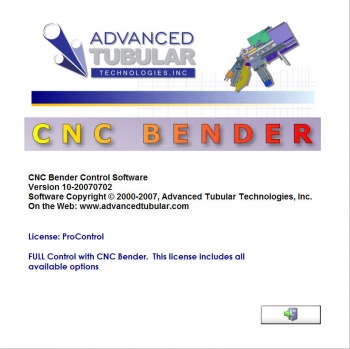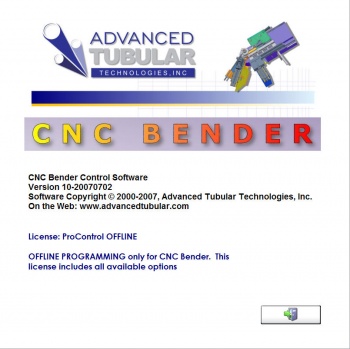Difference between revisions of "CNC Bender v10-20070702"
(→ENHANCED: Hardware Key Handling) |
(→ENHANCED: Hardware Key Handling) |
||
| Line 61: | Line 61: | ||
<td bgcolor="#e3e4f5"> | <td bgcolor="#e3e4f5"> | ||
| − | + | LiteControl licenses are now linked to a single specific hardware key. The setup of every PERMANENT KEYED LiteControl configuration file must be performed by Advanced Tubular before CNC Bender LiteControl will run.<br> | |
ProControl licenses are NOT linked to a specific hardware key, but the hardware key must contain a general ProControl license. | ProControl licenses are NOT linked to a specific hardware key, but the hardware key must contain a general ProControl license. | ||
</td> | </td> | ||
Revision as of 20:05, 2 July 2007
Contents |
REVISION Information
10-20070707, July 2, 2007
NEW: LiteControl GUI Update
The LiteControl now features the same updated GUI as the ProControl. It also requires the the higher screen resolution of 1024 x 768. (The older 800 x 600 is too low for the new software.)
NEW: Splash / Version Screen Shows License Type
CNC Bender can use one of four license models:
- ProControl Full
- ProControl Offline
- LiteControl Full
- LiteControl Offline
During startup or display of the version screen, the license type is displayed. For example, this shows the OFFLINE license type is running:
ENHANCED: Hardware Key Handling
There are new rules requiring hardware key setup for CNC Bender:
|
REQUIRED PROGRAM ID |
Hardware keys used for CNC Bender now require an appropriate program ID in both the time-limited and the permanent hardware key. |
|
PERMANENT KEYS |
LiteControl licenses are now linked to a single specific hardware key. The setup of every PERMANENT KEYED LiteControl configuration file must be performed by Advanced Tubular before CNC Bender LiteControl will run. |
|
TIME-LIMITED KEYS |
Neither LiteControl or ProControl licenses are linked to to a single hardware key. However, the hardware key must contain a setup for at least one of the four license types (see above). |
The LSL parameter is reserved for the Limit Switch Lower value. This is where the output for the tube support switches to active. The appropriate value is usually a Feed axis value of 0 units (millimeters). The LSU parameter is reserved for the Limit Switch Upper value. The appropriate value is the position to control at which forward feed position the tube support begins to drop. The value is always indicated in millimeters. Floating point values are allowed. The integer value after the LSL or LSU indicates the index position of the CIO inside the COMDEF. In this case, the index is 0, which is the first position in the list of CIO objects.
The CIO object is a SERVO MODULE COMMAND. The Modbus OpCode for setting programmable limit switches is 2013 for the first axis in a card, and 2014 for the second axis in a card. See the CIO library's "FeedAxisPLS5" CIO object to see how to setup a new CIO that an address any programmable limit switch. The first word value controls which output to address:
Word 1 value...
- is 0 to set output 1
- is 1 to set output 2
- is 2 to set output 3
- is 3 to set output 4
- is 4 to set output 5
- is 5 to set output 6
- is 6 to set output 7
- is 7 to set output 8
Words 2 and 3 are set aside for the low value. The LSL parameter stuffs values into these two words in a process list line.
Words 4 and 5 are set aside for the high value The LSU parameter stuffs values into these two words in a process list line.
The programmable limit switch values can be monitored using the I2T Module Interface software. Use the Programmable Limit Switches feature.



